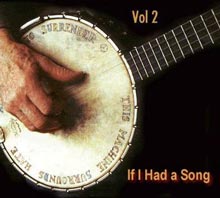
Music Matters Albums
Listen to samples of
music that matters.
Through iTunes
Through Amazon
Issue 15
Issue 16
Issue 17
Issue 18
Issue 19
Issue 20
Issue 21
Issue 22
Issue 23
Issue 24
Issue 25
Issue 26
Issue 27
Issue 28
Issue 29
Issue 30
![]()


Pete Seeger Link:
- Various
The Songs of Pete Seeger Vol. 2—If I Had A Song...
2001, Appleseed Recordings
 Listening to this collection of Pete Seeger songs it occurred to me that nothing changed on September 11. There was tragedy, war, hatred, misunderstanding and injustice before and after that sorrowful day. Similarly constant are the songs of Pete Seeger—songs of compassion for those who have suffered injustice and tragedy—songs that ring out danger, warning and love. I remember seeing Seeger a few years ago at the Clearwater Folk Revival. He stood alone, no entourage, no bodyguard—one of the most influential men of the twentieth century. His rendition of “We Shall Overcome” was sung at many a Civil Rights and Peace rally in the 60s and 70s. His banjo is inscribed with the words, “This Machine Surrounds Hate and Forces It to Surrender.” He has spent his life fearlessly singing songs that need to be sung. He is one of the rare people who can speak passionately about the things he believes in while retaining his essential kindness and a warm smile. I had consider requesting an interview with him, but what is there left to ask that has not been answered emphatically in one of his songs. After September 11 I again thought about interviewing Seeger. But there is nothing he need add to what he has already said about war and peace in his long career as an activist and musician.
Listening to this collection of Pete Seeger songs it occurred to me that nothing changed on September 11. There was tragedy, war, hatred, misunderstanding and injustice before and after that sorrowful day. Similarly constant are the songs of Pete Seeger—songs of compassion for those who have suffered injustice and tragedy—songs that ring out danger, warning and love. I remember seeing Seeger a few years ago at the Clearwater Folk Revival. He stood alone, no entourage, no bodyguard—one of the most influential men of the twentieth century. His rendition of “We Shall Overcome” was sung at many a Civil Rights and Peace rally in the 60s and 70s. His banjo is inscribed with the words, “This Machine Surrounds Hate and Forces It to Surrender.” He has spent his life fearlessly singing songs that need to be sung. He is one of the rare people who can speak passionately about the things he believes in while retaining his essential kindness and a warm smile. I had consider requesting an interview with him, but what is there left to ask that has not been answered emphatically in one of his songs. After September 11 I again thought about interviewing Seeger. But there is nothing he need add to what he has already said about war and peace in his long career as an activist and musician.
This is the second Appleseed Pete Seeger tribute featuring some of the some of the finest sing-songwriters of this generation. The songs are huge—they take on subjects of global impact with personal conviction and an unflinching, loving heart. Hearing these songs performed by others has given me a new appreciation of Seeger the songwriter. His personal qualities of voice and gentle humor seem inseparable from the songs when you here him perform. Hearing his compositions in other voices forces one to hear them on their own merits.
The first two songs, “Guantanamera” performed by Jackson Browne and Joan Baez and “If I Had a Hammer” performed by Billy Bragg and Eliza Carthy are much too familiar to be revelations to those of us who have known these songs all of our lives, but they have an undeniable melodic hook that caught the attention of the kids at my house. The next song, John Wesley Harding’s folk-rocking rendition of “Words, Words, Words” is certainly a song that can be cut whole from the past and pasted seamlessly into the present (and future, I fear). “Words words words in my old bible/ How much truth remains/ If I only understood them while my lips pronounced them/ Would not my life be changed./ Words words words in the Declaration…/Words words words in old songs and stories…/.” Like so many of Seegers songs, I would like give all world leaders a homework assignment to do a report on this song and have it in before they have a chance to screw anything else up.
“Walking On Death Row” may be the highlight of the album, with a passionate performance by Steve Earle. He is overwhelmed by the power of the song as he sings, and at times the words seem to catch in his throat. He sings of “hopes that used to be” and the flickering chance of reprieve. The song redirects its focus from the prisoners and their families to all of us in the brilliant final verse. “If we’d learn to love each other’s lives we would not be sitting here/ If only this you would believe/ We still might, still might be reprieved”
Dated by specific references to the Vietnam War and Richard Nixon, but current thematically is “Last Train to Nuremberg.” The sobering message of the song is that we are on the last train to Nuremberg if we sit idle while the government we elected and finance commits atrocities in our name.
Humor has long been the folk musicians’ best ally when telling the truth that people don’t want to hear. Sometimes it’s satirical, as in “Talking Union,” done here as a rap song. Other songs are spry and cheerful, in particular “Maple Syrup Time” by Moxy Früvous.
While social and political significance is a hallmark of his work, several of the songs demonstrate the poetry and beauty of which he is capable. Songs like “Oh, Had I a Golden Thread” sung by Dar Williams and Toshi Reagon, “Snow, Snow” by Eric Andersen and “You’ll Sing to Me Too” a touching song about singing to your children (or in Seeger’s case, the grandson for whom the song was written) by the Nicaraguan brother and sister duo, Guardabarranco are standouts in this regard.
The few songs that feature Seeger singing his own songs provide an emotional center for this collection. Pete Seeger is a folk musician. He sings and talks in his own voice, but it is our voice as well. If I had to record a voice to blast off into space for alien species to study, it would be his. What the years have taken in range, they have given back in depth. His whole career has been about what it is to be human—loving, involved, caring and connecting us all with a sense of humor and beauty. Pete talks with great optimism in the album closer “Well May the World Go,” noting the good changes we never anticipated, like the fall of the Berlin Wall. Seeger is steadfast in his belief that we shall overcome. Post 9/11 reality has an Oz-like solution. We’ve had the answers all along in our hearts, and we’ve been lucky enough to have had them in lyric and melody for the long years that Pete Seeger has been around.—Michael Devlin